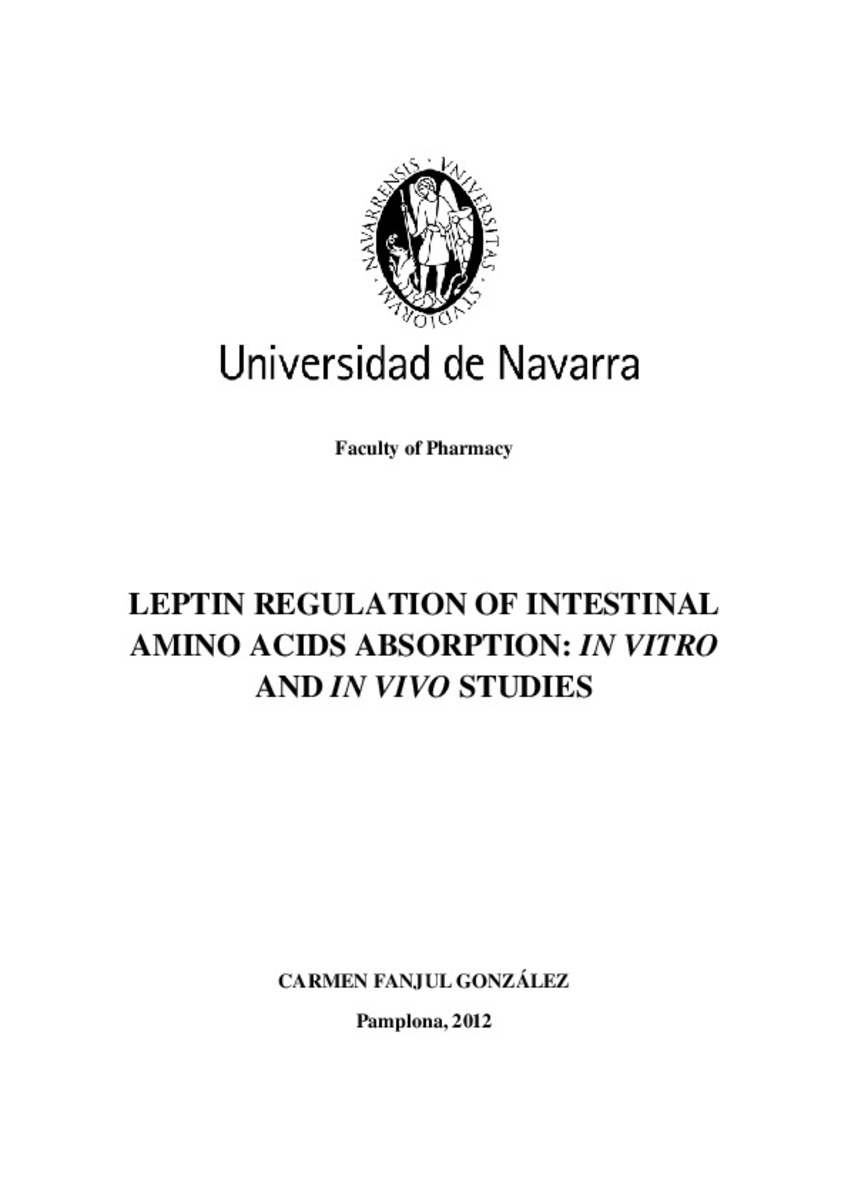Full metadata record
| DC Field | Value | Language |
|---|---|---|
| dc.contributor.advisor | Barrenetxe, J. (Jaione) | - |
| dc.contributor.advisor | Lostao, M.P. (María Pilar) | - |
| dc.creator | Fanjul, C. (Carmen) | - |
| dc.date.accessioned | 2015-07-22T08:25:08Z | - |
| dc.date.available | 2015-07-22T08:25:08Z | - |
| dc.date.issued | 2015 | - |
| dc.date.submitted | 2012-09-21 | - |
| dc.identifier.citation | FANJUL, C. ""Leptin regulation of intestinal amino acids absorption: in vitro and in vivo studies"". Lostao, M. P. (dir.) y Barrenetxe, J. (codir.). Tesis doctoral. Universidad de Navarra, Pamplona, 2012 | es_ES |
| dc.identifier.uri | https://hdl.handle.net/10171/38792 | - |
| dc.description.abstract | Hormone regulation of digestive secretions and gastrointestinal tract motility is well established, nevertheless, little is known about endocrine regulation of nutrients intestinal absorption and information on this regard is not included in the text books yet. For example, serotonin and CCK inhibit sugar absorption (Arruebo et al., 1989, Hirsh et al., 1996; Barber et al., 1997) whereas glucagon-37 shows a stimulatory effect (Stümpel et al., 1998). Serotonin also decreases leucine absorption (Salvador et al., 1996). Shortly after leptin identification, we demonstrated that leptin inhibits sugar absorption in rat intestine in vitro by short-term regulation of the Na+/glucose cotransporter SGLT1 (Lostao et al. 1998). In the same year, another group reported that the stomach chief cells secrete leptin into the gastric lumen after a meal (Bado et al. 1998). We later described that leptin receptors are expressed in both apical and basolateral membrane of human and murine enterocytes (Barrenetxe et al. 2002). In the present work, we decided to extend our studies and investigate the possible effect of leptin on amino acids intestinal absorption in rat and in Caco-2 cells, using in vivo and in vitro techniques. In summary, leptin acting from the apical membrane of the enterocytes modulates, in a short-term manner in vivo and in vitro, amino acids transport in rat intestine and human Caco-2 cells. The mechanisms implicated include direct effects on transporters expression in the apical membrane and indirect processes that leads to modulation of the activity of the implicated transporters. Leptin also rapidly inhibits amino acids uptake acting from the basolateral membrane. In both conditions, the inhibition is reversible. Interestingly, the activity of Na+-independent glutamate transporters was increased by leptin. Taken together, these results contribute to the vision of leptin as an important hormonal signal for the regulation of intestinal absorption of nutrients. | es_ES |
| dc.language.iso | eng | es_ES |
| dc.rights | info:eu-repo/semantics/openAccess | es_ES |
| dc.subject | Caco-2 cells | es_ES |
| dc.subject | Rat intestine | es_ES |
| dc.subject | Leptin | es_ES |
| dc.subject | In vitro | es_ES |
| dc.subject | In vivo | es_ES |
| dc.subject | Amino acids transporters | es_ES |
| dc.subject | Materias Investigacion::Farmacia | es_ES |
| dc.title | Leptin regulation of intestinal amino acids absorption: in vitro and in vivo studies | es_ES |
| dc.type | info:eu-repo/semantics/doctoralThesis | es_ES |
Files in This Item:
Statistics and impact
Items in Dadun are protected by copyright, with all rights reserved, unless otherwise indicated.






